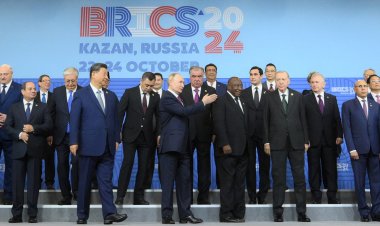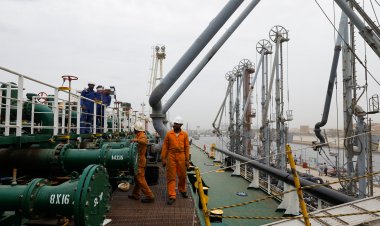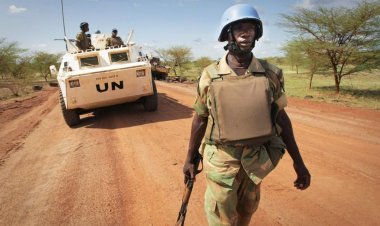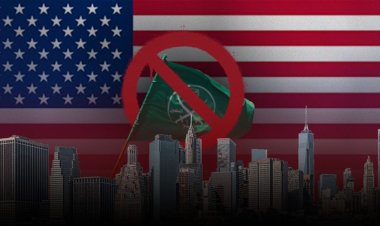Russia-Ukraine War and its Impact on the Caspian Energy Geopolitics
The geopolitics of the Caspian region is undergoing a tectonic shift due to the present Russia-Ukraine war. Russia, being a traditional supplier of energy and also a Caspian player, is at loggerheads with the European countries in recent years, especially after the outbreak of its War with Ukraine. On the other hand, three other Caspian countries, Kazakhstan, Turkmenistan and Azerbaijan, are trying to extend their leverage in the European energy market by emerging as alternatives to Russia. This aspect provides a twist to Caspian energy geopolitics. India can also take advantage of the flux in the Caspian energy geopolitics by ensuring energy supply from the Caspian countries.
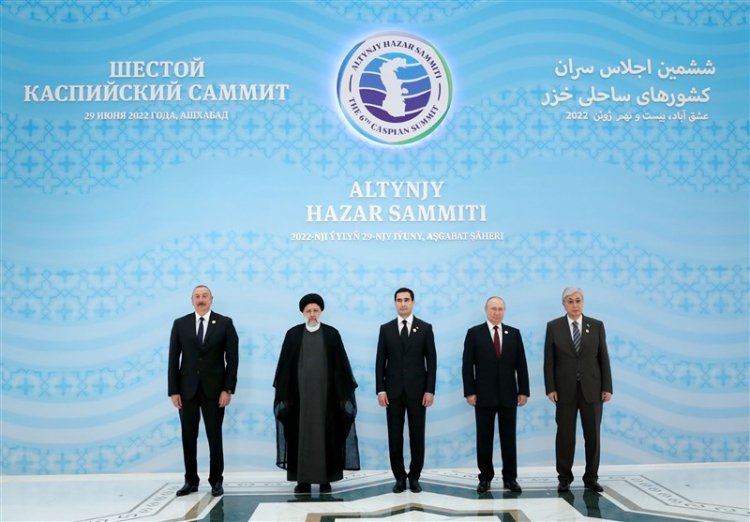
Analysis
By Nalin Kumar Mohapatra
For the last 11 months, Russia has been in a state of war with Ukraine, and it is difficult to predict when the war will end. On the other hand, the consequences of the present war are manifold. It ranges from the devastating impact on Russia as it is under a spell of international sanctions to Ukraine, which suffered heavily, including humanitarian suffering due to Russia’s missile attack. At the same time, the global community is also suffering a lot due to the disruption of the supply of food grains from Russia and Ukraine, along with fertilizers from Russia and Belarus. Similarly, Russia's oil and gas supply to the European market has also been disrupted. This is because Ukraine is a transit country for Russian oil. It is a fact that European countries have been hostage to Russian energy for an extended period. However, along with Europe, even the sanction on Russia is aggravating the energy crisis for Asian countries.
Over time, this artificial energy supply securitization crisis is hitting the international energy market quite hard. As a result of the energy deficit, European countries are searching for new markets from where they can source energy to meet the current crisis. The problem is further aggravated with the onset of winter. Along with supply securitization, the rise in the prices in the international market adds further problems for energy-importing countries. In this regard, ultimately, the people are the worst sufferers. The issue of the energy crisis, which Europe is currently confronting has also attracted the attention of the United Nations. The United Nations report titled “ Energy crisis poses a threat to Europe’s industrial sector”, says that “high prices could create lasting damage, eroding Europe’s competitiveness in high-energy manufacturing activities, causing losses in market share, and prompting companies to relocate to countries with lower energy ”.
The above UN report is a pointer in this direction of the current crisis European Union [EU] countries have been confronting since February 2022. The rise in energy prices aggravates the economic crisis, including high inflation in Europe. However, the European countries are also looking for new energy sources, including from the Caspian countries like Kazakhstan, Turkmenistan and Azerbaijan. In this context, the European countries are now looking towards these three Caspian countries. Thus, a new kind of energy geopolitics in the Caspian region is emerging. While the West has imposed sanctions on Russia, the other Caspian countries are eager to explore new markets in Europe. Thus, the present Russia-Ukraine war is a blessing in disguise for Baku, Astana and Ashgabat.
It is necessary to underline here that since the onset of the Russia-Ukraine War, a few pipelines, like the Trans-Caspian Pipeline, and the Baku-Tbilisi-Ceyhan [BTC] pipeline, (came up with Western assistance to bypass Russia for energy export to the international market) are proving a boon for these countries. At the same, allegations are coming to the fore that Russia is using the Caspian Sea as a hub for launching missiles against Ukraine in the present War. One may recall that during the Syrian war, Russia also launched similar missile attacks from the Caspian Sea. In fact, since the Tsarist time, Russia has deployed the Caspian Flotilla to gain dominance in the Caspian Sea.
In this regard, the promising Gas project, the Southern Gas Corridor (SGC) completed in 2020 with funding from the EU is emerging as one of the most promising ones for these three countries as they are more interested in circumventing Russia. As the SGC website shows, it will cover a distance of 3,500 kilometres starting from Azerbaijan, ending in Italy, and passing through Georgia, Turkey, and Greece. The SGC, as studies suggest, also connects with the two other major pipeline initiatives launched to connect Caspian energy with Europe, namely Trans Anatolia and Trans Adriatic.
In the aftermath of the Russia-Ukraine War, the three Caspian countries, Kazakhstan, Turkmenistan and Azerbaijan, are trying to assert themselves from the Russian shadow. This can be evident from the role being played by these three countries in exporting energy to the international market. At the same time, the European countries are also changing their tune regarding the democratic credential of these countries. As in the past, the EU took a hard-line posture, particularly with Turkmenistan and Kazakhstan. However, understanding the new realities, the EU is paying scant attention to the normative issues, which were once a high priority for them. Another critical issue that needs attention is that Turkmenistan, under Serdar Berdimukmedov, is trying to overcome its legacy of “ Permanent Neutrality” as envisaged by late President Saparmurat Niyazov and is interested in developing relations with Western countries on an equal footing. This is also a positive sign for Turkmenistan as it is interested more in diversifying its energy relations with Western countries and reducing its dependence on China. It is a fact that Turkmenistan is unhappy with the gas deal with China, which came through the Central Asian Gas deal way back in 2009. The pricing issue and the excessive monopolization by China of the Turkmen gas are pretty annoying for Turkmenistan. However, the new bonhomie with Europe provides a new outlet for Turkmenistan’s energy. As news reports suggest, Turkmen gas will go not only to Europe through Azerbaijan and Georgia, but also to Italy with an annual capacity of 30 billion cubic meters annually. Similarly, as studies suggest that efforts are also going on to develop a gas alliance with Central Asian countries like Kazakhstan and Uzbekistan and Turkmenistan. Though the Russian proposal for an energy alliance with Kazakhstan and Uzbekistan has not much headway. In this context, there is a need for a relook at Caspian energy geopolitics in the regional and global geopolitical contexts. Since the beginning of the war in February 2022, efforts have been going on to develop and bring Turkmen gas to Europe of around “10 billion to 30 billion cubic feet of gas” annually to Europe.
Coming to Kazakhstan’s role in the context of Europe’s energy security, it can be added that Astana can play a significant role in meeting both conventional and non-conventional sources of energy and meeting the food security of Europe. However, three issues must be looked at simultaneously while addressing the question of Europe’s energy security. In this regard, Kazakh President Kassym-Jomart Tokayev, in a speech in November 2022, underlined that “ Taking into account the current situation on world markets, the further development of the Trans-Caspian route is of particular importance. On this issue, we have mutual understanding with partner countries”. At the same time, Kazakhstan is also strengthening rail linkages with both Iran and Turkmenistan for enhancing energy cooperation.
In this context, the Kazakh government is mulling over exporting more oil through the BTC pipeline to the European market. As reported, the Kazakh oil will reach Azerbaijan and then run to Europe through the BTC pipeline. Similarly, as studies suggest along with river port, as stated by Kazakh Prime Minister Alikhan Smailov, the Kazakh government is planning to export around “1.5 million tons to 6-6.5 million tons of oil”. If the plan can be materialized, it could undoubtedly alleviate the present EU’s energy crisis to a greater extent.
It may be added here that Kazakhstan is a Caspian country, but refused to recognize Russia’s annexation of three regions of Ukraine. Similarly, Moscow is using retaliatory tactics by stopping the delivery of Kazakh oil exported through the Russian port of Novorossiysk. Currently, the Caspian Pipeline Consortium(CPC) is the only traditional route transported through Russia. Thus one can notice the impact of the Russia-Ukraine war on the three Caspian countries mentioned above.
Similarly, Azerbaijan is also emerging as another forerunner in meeting Europe’s energy crisis. In this regard, in a Memorandum of Agreement that Azerbaijan signed with the European Union in July 2022, the former has promised to supply “ 11.5 billion cubic meters” to Europe, as Azerbaijan Energy Minister Parviz Shahbazov stated. The same can be further increased to “27 billion cubic meters” as per the Agreement. Before the war, the Azeri-Chirag-Gunashli[ACG] gas region, operated by British Petroleum (BP) along with the State Oil Company of Azerbaijan Republic [SOCAR], is also planning to augment energy production, which, as studies suggest, will produce “ 300 million barrels” of oil, as reported. Thus, the surge of production in the ACG oil field will, to a significant extent, meet Europe’s energy security crisis in the future. At the same time, Azerbaijan has also reached a swap agreement with both Turkmenistan and Iran, substantially enhancing energy export to European countries. This swap agreement might alienate Russia somewhat from the Caspian energy diplomacy.
What can be inferred from the above analysis is that the energy crisis in Europe is back in focus on the Caspian countries-Kazakhstan, Turkmenistan and Azerbaijan. If these three countries supply energy to EU countries, it can mark a new phase in Caspian geopolitics. However, a question arises whether these three countries can jeopardize their relations with Russia while bridging their energy cooperation with the EU. For instance, as per the website of CPC, Kazakhstan shipped around, “60,727,798 tons of gross oil at CPC Marine Terminal in 2021” in Russia. This signifies the importance of Russia in the Caspian energy market. Also, Iran, another Caspian player, can bring out regular multilateral arrangements signed among these five countries which may disrupt energy production. This aspect may also pose a future challenge to the energy export from these three Caspian countries to Europe.
It is a fact that after the Russia-Ukraine war, it impacted the Caspian countries’ energy trading. Though Europe’s energy market is emerging as an attractive option for these Caspian countries, many geopolitical issues will arise in the long run. This is more so as Russia is the traditional player in the Caspian geopolitics, and one cannot ignore its role despite new alternative options being available.
The strategic developments in the Caspian countries will impact India’s quest for sourcing energy from this part of the world. However, a potential question that may arise here is how India can benefit from Caspian energy. This is more so as Kazakhstan, Turkmenistan and Azerbaijan have surplus energy, which can be supplied to India. Since the Turkmenistan-Afghanistan-Pakistan- India [TAPI] pipeline is in a state of doldrum, alternative proposals need to be assessed.
As there is a swap agreement in place among Turkmenistan and Azerbaijan with Iran , oil and gas can be delivered to India from the Iranian ports. In this regard, the Chahbahar Port, the Bander Abbas Port of Iran, and the Turkmenbashi Port of Turkmenistan can significantly deliver energy. At the same time, India can take advantage of the International North-South Transport Corridor (INSTC), which can also play an essential role in augmenting energy trade, particularly with Russia, Kazakhstan, Azerbaijan and Turkmenistan along with Iran.
This is a fact that Russia is emerging as a reliable supplier of oil to India. Similarly, the President of Turkmenistan, Berdimukmedov and Kazakh President Tokayev are keen to strengthen energy cooperation with India. Along with Chahbahar Port, oil from Kazakhstan to India can be imported through the Russian port of Sabetta. Kazakhstan is already delivering oil to South Korea and Japan through rivers Ob and Irtysh. Hence, the same can be joined with Sabetta, and the Indo-Pacific Corridor can be crucial in transporting Kazakh energy to India.
In conclusion, it can be underlined that War between Russia and Ukraine provides both opportunities and challenges for the Caspian countries like Kazakhstan, Turkmenistan and Azerbaijan. Opportunity in the sense that these three countries are diversifying their energy supply and challenges as they have to bypass Russia, a traditional player in the Caspian energy game. Hence one can witness a complex geopolitical development in the Caspian region due to the Russia-Ukraine war.
Disclaimer: This paper is the author's individual scholastic contribution and does not necessarily reflect the organization's viewpoint.



